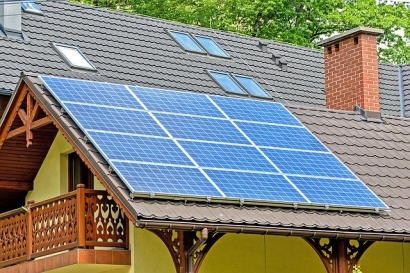
Deciding if it's the right choice for your home involves careful consideration. Here are a few things to keep in mind.
Benefits of Solar Homes
Solar energy can be an excellent long-term investment. Here are some of the advantages of solar panels.
Solar power from the panels relies on the sun's energy instead of fossil fuels. This reduces your reliance on utility companies, lowering your electricity bills. In fact, you can save about $10,000 to $30,000 over a lifetime. You don't have to feel guilty for turning up your air conditioner during the summer. Plus, these savings can also go toward rent or entertainment expenses.
More than 80% of homebuyers say energy-efficient features are important to them. The cost-savings are also a draw. Solar panels are popular in metropolitan areas like New York and San Francisco, which are more vulnerable to pollution and have higher living expenses. Solar panels can reduce greenhouse gas emissions and lower monthly costs.
No fossil fuels are required since the solar panels run off energy from the sun. In 2018,
89% of global carbon dioxide emissions came from fossil fuels. These emissions can raise global temperatures and lead to more severe storms. However, solar panels absorb sunlight through photovoltaic (PV) panels. The energy creates an electric charge that responds to an electrical field, causing power to flow.
Investing in solar panels can be costly, but you can earn money back over time. One way is through the increased value of your home when you sell. Clean energy sources can also help with tax deductions. For example, the residential energy-efficient property credit applies to solar electric homes. Also, if your house has the proper inverter, you can sell excess power back to your utility company.
Things to Consider
Solar panels can be a wise investment. However, there are a few drawbacks you want to keep in mind.
Solar panels provide long-term savings but often require a higher upfront cost. The price ranges from $11,144 to $14,696 for an average-sized home. You should budget for this purchase ahead of time.
It also may not be a good investment if you're just buying the house. You may want to save money for essential expenses, like the down payment. This cost can be about 3.5% of the home's value.
Some nontraditional roofing types may not work well due to the complex installation. For example, wood or slate tiles are less compatible with the panels. These materials are more brittle and can create a fire hazard. Another thing to consider is the slope of the roof. A steeper angle can decrease efficiency and makes panels dangerous to install.
One of the main perks of solar energy is the savings. However, it might not be worth it if you live in an area with lower electricity expenses. The savings may be too minimal to balance out the upfront costs. Instead, you may want to put your money in other house upgrades, like remodeling the kitchen, which can increase your home's resale value.
There are fewer skilled professionals due to newer technology and complex installation processes. This can make it harder to find a trusted professional. Also, some companies send pushy door-to-door sales representatives that try to get you to sign a contract right away.
Instead, get recommendations from friends or your local utility company. Look up the business's credentials and past reviews before signing anything. You can also use online comparison tools, such as the EnergySage Marketplace.
Should You Install Solar Energy?
The decision to install solar energy in your home is a personal choice. It can have long-term financial paybacks, and you can save on electricity bills and increase your home's resale value. However, you should consider the higher upfront costs and the type of roofing materials you have before making the final call.
Rose is the managing editor of *Renovated* and has been writing in the home living industry for over five years. She’s most passionate about sustainable building and incorporating similar resourceful methods into our world. For more from Rose, you can follow her on Twitter.

